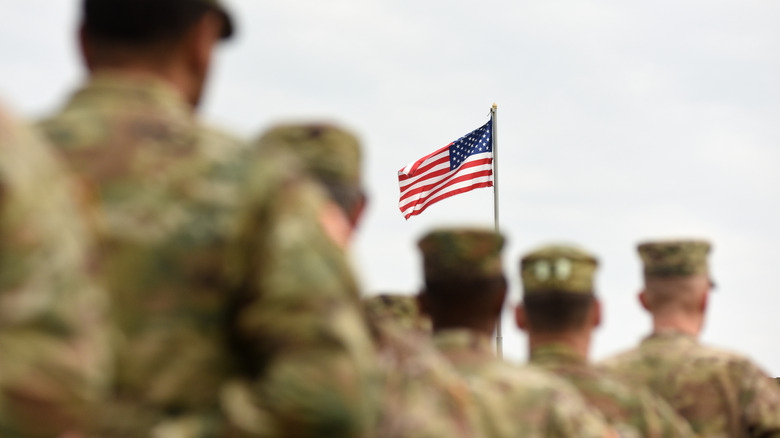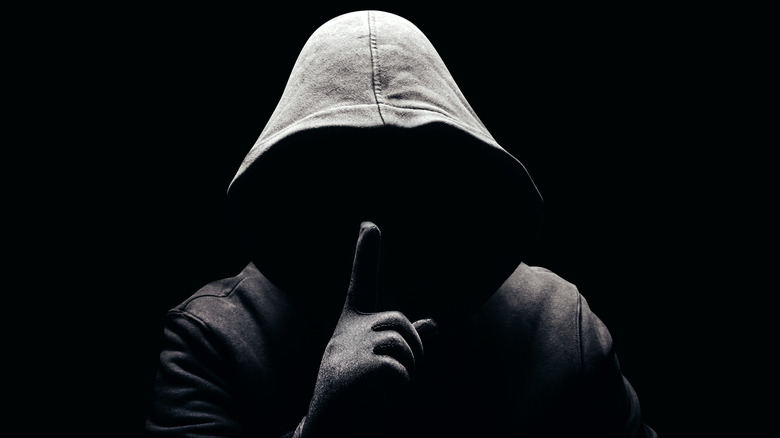Exclusive Clip: Hear A Marine's Disturbing Story From Warrior To Killer In His Own Words
Content warning: The following article contains graphic descriptions of murder, as well as discussion of PTSD in a marine.
By the time Dr. Al Carlisle interviewed Vietnam veteran "Danny" in the late 1980s, he'd already had decades' worth of experience delving into the minds of killers. "Danny" — a pseudonym — was an emblematic, almost archetypical case study in the effects of post-traumatic stress disorder (PTSD), especially as it relates to veterans who come home and fall through the cracks of societal support. Danny was "really agitated," "angry," "afraid," and highly conflicted. He'd been thrilled after making his first kill in combat because that's how he was supposed to feel. But by the time he reached kill number nine, 10, 11, etc., he was a completely different person. Then when Danny went home after the war, he just continued killing.
This story comes to Grunge by way of the Oxygen network's "Violent Minds: Killers on Tape," a show which features interviews with well-known serial killers like Ted Bundy and lesser-known killers like the men responsible for the Hi-Fi Murders in Ogden, Utah. Dr. Carlisle, a Utah-based clinical psychologist who presaged the FBI's famed mindhunter program, sat across the table from murderers of all stripes for about 50 years. He recorded and documented his conversations with these individuals — recordings that were once thought lost but have since resurfaced. Dr. Carlisle took his conversations with Danny as a chance not only to learn about one man and his crimes, but PTSD at large. And Danny, he concluded, was not a natural born killer — he was manufactured through war.
The Broken Samurai
Danny isn't some high-profile killer who landed in a lot of newspapers. In fact, the exclusive clip above shared with Grunge reveals that Danny was never charged with a single murder. He merely confessed to Dr. Carlisle, who listened and documented, and that was that.
According to Danny, everything changed for him when his best friend Philippe died in the Vietnam War. A landmine went off, Philippe screamed, and Danny stayed with him until he died. In Dr. Carlisle's recorded sessions, Danny says, "I'm sure it took only a few minutes for him to die, but it seemed to take forever. He had risked his life to save my life and now I couldn't do anything to save him." This feeling of guilt stayed with Danny for the rest of his life, and transformed his every action into trauma-induced vengeance. As someone who'd been enamored with tales of Japanese samurai and legends of Arthurian knights, Danny also considered himself "bound by honor, justice and loyalty" and thereby exonerated of wrongdoing when killing.
By his own count, Danny went on to kill about 12 Vietnamese soldiers in combat. He also, however, hunted Vietnamese people hiding amongst the bodies of the dead after battles. In an act of "cleansing," or "payback," Danny executed them. "They were wounded," he said, "so I just walked up to them and then shot them. As they were kneeling, each guy, I shot him with a pistol one time in the back of his head."
The unfulfilled penance of war
Danny felt betrayed by war protests back home. Dr. Carlisle said, "Danny felt he had been deceived by the government, abandoned by his family, and was unwanted by nearly everyone. He had developed a combat personality to survive the war, but it was out of place now." Dr. Carlisle concluded, "He was a samurai warrior in an environment where there was no need for one."
After returning from Vietnam, Danny fantasized about creative methods of murder day and night, and eventually made good on his impulses. He started by randomly pistol-whipping a man on the street one night and robbing him, and moved on to killings and heavy drug use. One time, for instance, he waited in a dark doorway and shot a passerby in the back of the head with a shotgun. He even got involved with a biker gang and became a killer-enforcer for them. He says that he felt no remorse for his actions; rather, the murders brought him peace. "It's better than any narcotic," he confessed.
Dr. Carlisle chalked up Danny's feelings to PTSD, saying that Danny was resolving his wartime trauma through continued murder. Dr. Carlisle was also quick to point out that veterans typically don't turn violent when returning to civilian life. The war "stole his [Danny's] humanity," he said. Danny's murders went unseen and unheard, and he eventually died of a stroke at age 48 after being released from prison, where he had been incarcerated for theft.
Watch this episode of Violent Minds: Killers on Tape this Sunday, April 30, at 7/6 pm Central on Oxygen.

